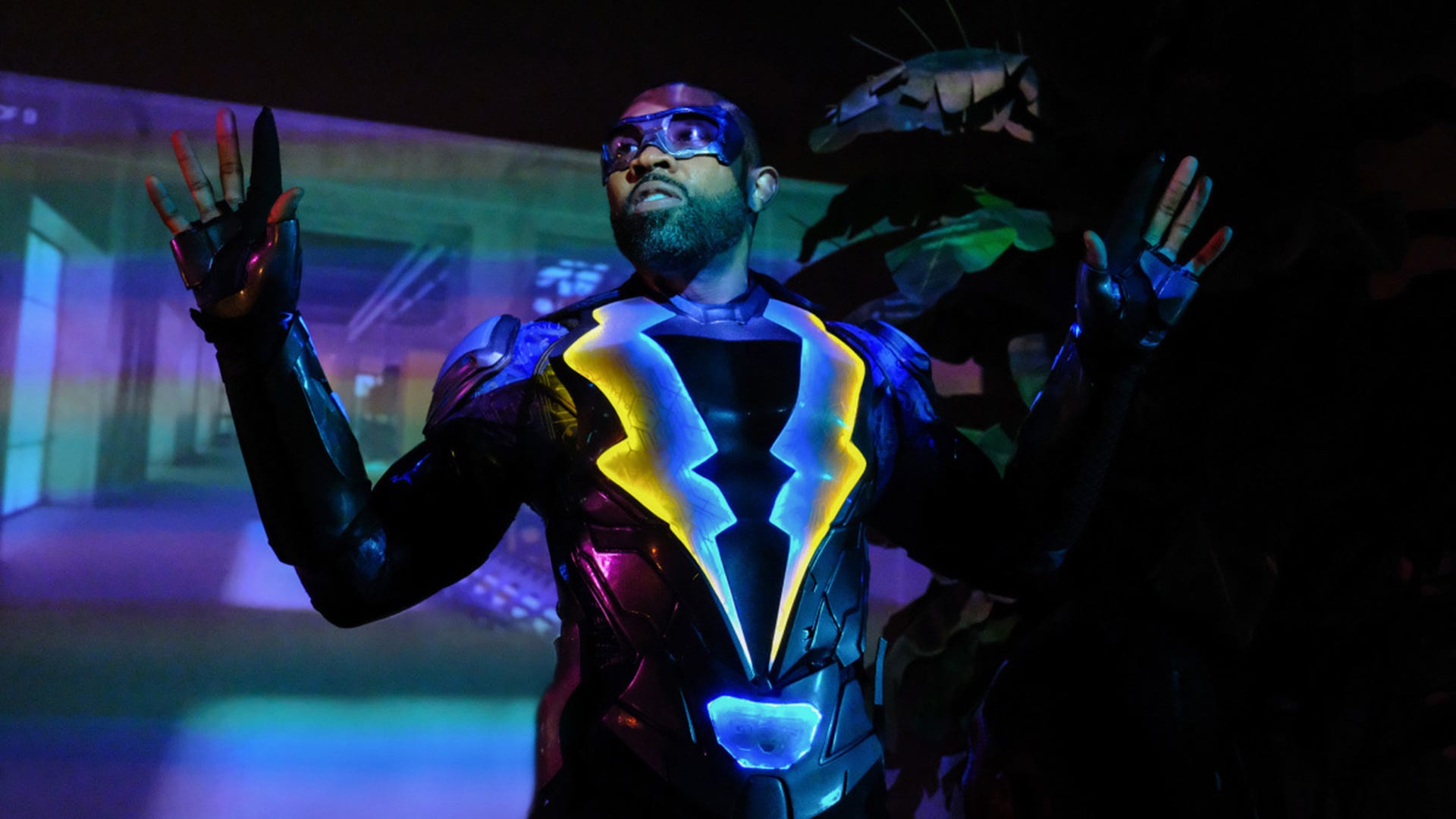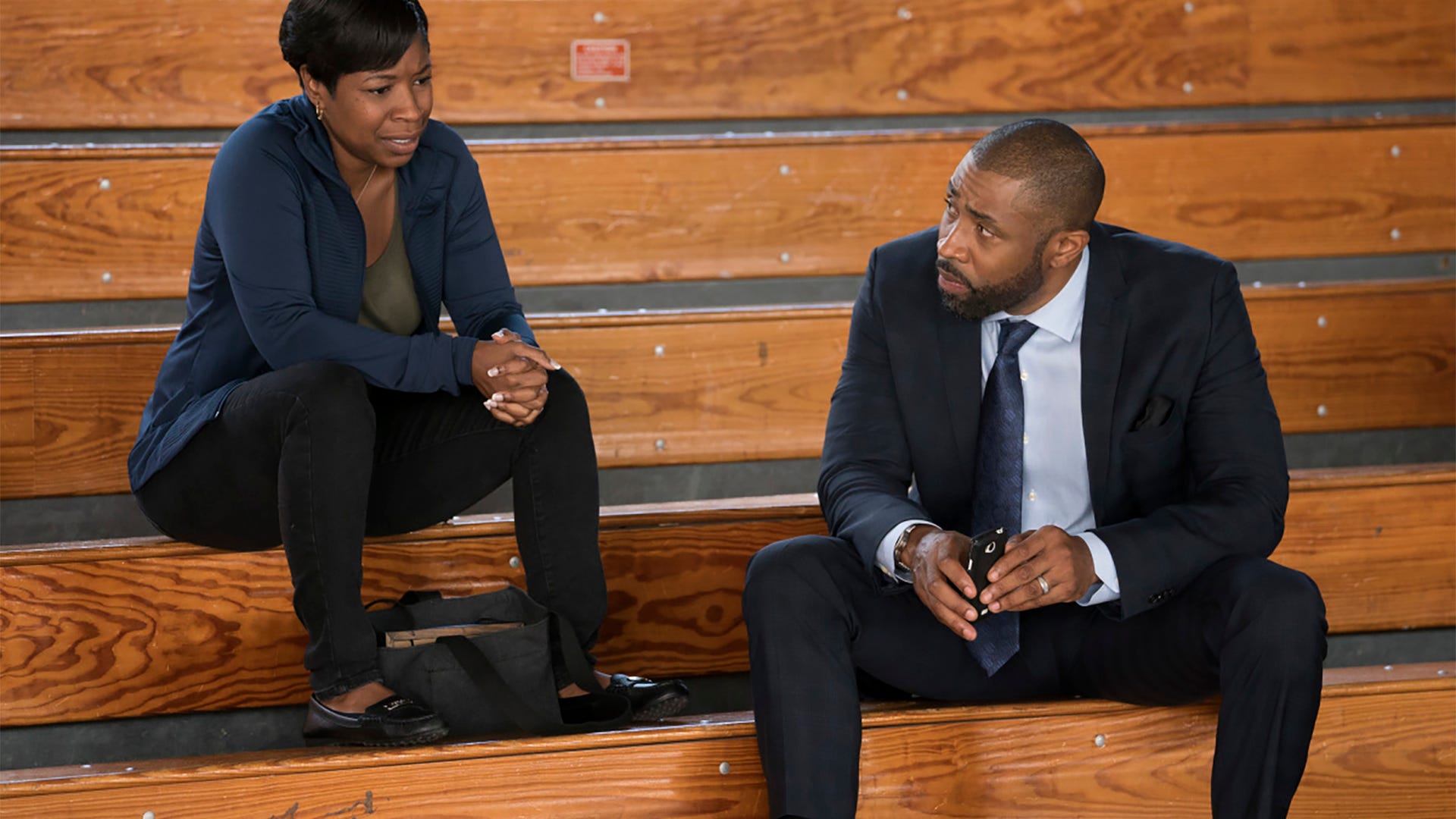Join or Sign In
Sign in to customize your TV listings
By joining TV Guide, you agree to our Terms of Use and acknowledge the data practices in our Privacy Policy.
Why Black Lightning Has a Heavier Burden to Bear than Other Superheroes
It runs so much deeper than it seems
In 1926, famed black scholar and lecturer W.E.B. Du Bois started a debate that's still raging today. Headlining a conference for the Chicago NAACP, Du Bois defined what he thought black art should be. "I do not care a damn for any art that is not used for propaganda," he said, explaining that black artists, poets and the like should make work that depicts them as noble and exemplary -- the best defense against racism. Others, like Harlem Renaissance writer Alain Locke maintained that "beauty, rather than propaganda should be the object of Negro literature and art," arguing that black art -- no matter how messy and truthful -- has value on its own merits and shouldn't be justified to people who don't see black folks as valuable in the first place. Almost 100 years later, black creators still wrestle between the two notions, torn between feeling obligated to present themselves upwardly mobile like the agreeable professionals of black-ish, or as just as they are, unsavory imperfections and all, like the messy millennials on Insecure.
Black Lightning Is The CW's Most Personal Superhero Story
Salim Akil and wife/creative partner Mara Brock Akil didn't have this debate while creating Black Lightning, a show about a superhero who, as Mara Brock Akil says, is "black on purpose." At the Television Critics Association earlier this month, the executive producers (Girlfriends, Being Mary Jane, The Game) seemed to have never entertained any notion to the contrary. "In the times we are in," Mara Brock Akil said, "I hope we are asking ourselves, 'What am I going to do to make change for the better? I hope this show resonates in that way."
Considering Black Lightning is The CW's highest-rated premiere in two years, Jefferson Pierce's (Cress Williams) story is indeed resonating. That's because the Akils constructed a hero whose home life, work life and superhero life all dive deep into his heritage and the state of the black union today. In the first few frames of the first episode, Black Lightning shows a couple mourning a child lost to gang violence; activists protesting The 100 gang in their community; Jefferson as a beloved principal at his school; and Jefferson being accosted by white police officers for driving while black. At a time when black people continue to have the highest rates of poverty and lowest median wealth and still have to explain why driving past a Confederate statue every day makes them uneasy, Black Lightning is very deliberately depicted as a thoroughly upstanding, educated family man his people can look up to. Score one for Team DuBois.

Cress Williams, Black Lightning
Guy D\'Alema, Guy D\'Alema/The CWTwitter Is Already in Love With Black Lightning
The ratings are even more astonishing considering black superheroes are still a rarity on television. Those that do exist fall into two categories, the first of which puts brown faces in masks and spandex because of "colorblind" casting. The Flash's departing Wally West (Keiynan Lonsdale) and evenSupergirl's James Olsen (Mehcad Brooks) belong in this group. Heroes who zoom and run around in their suits, they never deal with the complexities of being a minority. Racism is largely overlooked in the Arrowverse (though Supergirl explores it as it pertains to aliens), so their ethnicity is a non-issue. Certainly, that counts as progress in a medium where people of color have been underrepresented; they get to just be themselves, unbound by anybody's notion of how they're supposed to represent their race. The second type of black superhero is black like Luke Cage. He lives in a world where people listen to Kendrick Lamar and get their hair cut in black barbershops. His identity politics remain essential to the character and the story.
Black Lightning is certainly cut from the same cloth as Luke Cage -- Jefferson Pierce's blackness is undeniable to both the other characters and the audience -- but he has significantly more stakes than Luke Cage, which makes his burden exponentially greater. He's in and of the people, the self-appointed savior of the neighborhood and, metaphorically, the whole race. Yes, other 21st century superheroes get tasked with being the figurehead of marginalized groups -- Jessica Jones is the reluctant survivor; Daredevil thrives in spite of a physical handicap -- but the standard superhero narrative is that they spend a lot of time running away from the job rather than toward it. Even Luke Cage, introduced in Marvel's Jessica Jones, spent a lot of time running away from Harlem (to other neighborhoods, even other states!) and its problems before being lured back in. Black Lightning on the other hand, dives all in, an eager soldier in the DuBois army.

Tracey Bonner and Cress Williams, Black Lightning
Richard Ducree/The CW
"I had to reflect on it," Salim Akil told TV Guide of his thinking, going into creating the series. "I've been given this platform -- given his character -- and now I can just play with it, or do I use my power to actually try and do something?"
Akil's drive manifested in Jefferson Pierce. While he's torn between his family and superpower, it's clear that he will never abandon his community, even if it costs him his wife and the ability to bring real change to Freeland. And in choosing to take on that burden -- rather than run or wait until he's dragged in kicking and screaming -- it doesn't really matter whether Jefferson is in or out of the mask, he's still the standard bearer, the person who people look to for answers, in Freeland. It's a monumental task, Cress Williams said.
"When I think about it, yeah, of course it's unfair, but it's also life. That's why it's so easy to identify with the character," he said. "As a black actor, everything I do has to represent the entire race. But the reason [that expectation] is there is because we don't have all the options to show the full range of who we are, so when one pops up, it's like, 'You have to be everything.'" Williams, Salim Akil and Jefferson Pierce don't have the luxury of considering the weight placed on them. "If I sit and think about it," said Williams, "I'm not getting out of bed."
Nothing about Black Lightning's exceptionalism is accidental. For the Akils, as black showrunners working on what's about to become the standard bearer for black superheroes on TV, finding themselves in the same position of their titular hero is nothing new. But for them, Black Lightning is simply personal.
Salim Akil grew up in Richmond, Calif., a town outside Oakland that's just turning a corner after decades of black unemployment and gang violence. In the 1980s, relations between police and minorities were so bad that a judge, according to the Los Angeles Times, said that the Richmond police department authorized brutality against black residents, exemplified by a $3 million civil penalty against the department. In 2007, the homicide rate was more than eight times the national average. Freeland, Black Lightning's setting, has a more hopeful, conspicuous ring to it than Suicide Slum, Jefferson's home in the comics, but the conditions and the want to overcome them are the same for Akil, Jefferson Pierce and his alter ego. Black Lightning represents the best of a man's self, as superheroes do, but also serves as a call to action for the black people watching. "It's not just beating people to hell," Williams said. "It's education. It's, 'How do you pull up a nation?' It's all these things that he's trying to conquer, not on high, but in the midst of the community."
When The CW announced early on that Black Lightning would not exist in the the Arrowverse, outrage and confusion reigned as some saw the separation as exclusionary and segregationist. It turns out to have been a smart call. To untangle Jefferson Pierce from the reality he reflects simply to drop him in a world without a specifically black experience would've been silly. Black Lightning (the man and the show) has a lot of work to do; that's just the way it is. Peter Gambi (James Remar), Jefferson's father figure, makes this clear to Lynn, who's still struggling with the idea that her man has to be all things to all Freeland's people. "His city needs him," he tells her. That sounds a lot like Mara Brock Akil's proclamation, and what she wanted every viewer to understand about Jefferson, and themselves. Mr. DuBois would be proud. Hell, Locke would be too.
Black Lightning airs Tuesdays at 9/8c on The CW.
(Full disclosure: TV Guide is owned by CBS, one of The CW's parent companies.)
